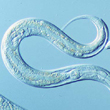Monday, 11 March 2013
Free Radicals and Aging: More Complicated Than We Thought
 In 2010, Dr. Siegfried Hekimi and his colleagues at McGill University in Montreal received a great deal of media coverage for their research showing that antioxidants, which many people take as food supplements to fight the damaging effects of free radicals, not only do not slow down the aging process but on the contrary might actually accelerate it. Even more unbelievably, when the researchers used Caenorhabditis elegans, a species of small worms, as an animal model and exposed them to an herbicide that is toxic to humans and generates a lot of free radicals, these worms lived 60% longer than worms who were not exposed to it!
In 2010, Dr. Siegfried Hekimi and his colleagues at McGill University in Montreal received a great deal of media coverage for their research showing that antioxidants, which many people take as food supplements to fight the damaging effects of free radicals, not only do not slow down the aging process but on the contrary might actually accelerate it. Even more unbelievably, when the researchers used Caenorhabditis elegans, a species of small worms, as an animal model and exposed them to an herbicide that is toxic to humans and generates a lot of free radicals, these worms lived 60% longer than worms who were not exposed to it!
These results appear to contradict the free-radical theory of aging, first proposed in 1956 by Denham Harman, who has gathered a large volume of experimental data supporting it since then. This evidence has seemed so compelling that this theory has become an essential part of any explanation not only of aging, but also of neurodegenerative diseases such as Alzheimer’s.
The free-radical theory of aging is based on the fact that certain biochemical reactions in human cells turn oxygen molecules into highly reactive free radicals. These free radicals then damage the cells’ proteins, DNA, and membranes, which, according to the theory, accelerates aging. Our cells do have a natural defence mechanism against free radicals, a sort of endogenous antioxidant: the enzyme superoxide dismutase (SOD), which neutralizes them. Whenever researchers have successfully deactivated this enzyme, in organisms such as yeasts, flies, and mice, they have developed cancers and died younger.
But not Dr. Hekimi’s little worms: when he disabled four of the five genes that let this species produce SOD, the worms lived just as long as normal worms; when he disabled just one of these genes, they lived 30% longer! That is one of the criticisms that he has received about the implications of his studies for human beings: C. elegans has five SOD genes, but humans have only two. In what tissues and cellular compartments are these three extra genes expressed? Scientists will have to answer this question if they are to better to understand the surprising effects of deactivating these genes.
While the effects are indeed surprising as regards longevity, they do not seem to call the toxicity of free radicals into question: though these worms did live longer, they also showed signs of oxidative stress that might have made them vulnerable to cancer or other diseases if they had been living outside the laboratory.
Hekimi nevertheless thinks that his findings should make scientists reconsider the relationship between free radicals and the increased cell damage that occurs with aging. He suggests, for example, that his SOD-deficient worms may have suffered greater damage to their mitochondria, which would then have provided less energy to the cells, thus slowing their metabolism. And according to one alternative theory of aging for which some supporting experimental findings also exist, slowing of the metabolism is associated with greater longevity.
In short, there is nothing simple about aging or about what causes it. But Hekimi’s results do make it problematic to portray regular consumption of antioxidant supplements as a fountain of youth, especially since they have never been proven to increase longevity. In contrast, we do know that people who simply eat fruits and vegetables regularly are healthier than people who do not. Fruits and vegetables do contain some antioxidants, but they also contain numerous vitamins, fibre, and other substances with a variety of proven benefits for overall health.
![]() Free Radical Shift: antioxidants may not increase life span
Free Radical Shift: antioxidants may not increase life span
![]() Un pavé dans la mare des antioxydants
Un pavé dans la mare des antioxydants
![]() Mutant worms defy aging theory
Mutant worms defy aging theory
![]() A Mitochondrial Superoxide Signal Triggers Increased Longevity in Caenorhabditis elegans
A Mitochondrial Superoxide Signal Triggers Increased Longevity in Caenorhabditis elegans









This type of research seems to serve well those people with anti-supplement contentions. Caution seems at place when trying to extrapolate from a laboratory study on worms to humans. Several animal experiments have shown that the longest living animals are those with the highest level of SOD. Furthermore, contrary to this author’s claim here that antioxidants “have never been proven to increase longevity”, numerous studies with animals documented that various antioxidants increased longevity, even expanded the maximum lifespan. Most anti-supplement reports are either based on politics (see http://www.supplements-and-health.com/dietary-supplements-risks.html ) or a poor grasp of the medical literature on supplementation.